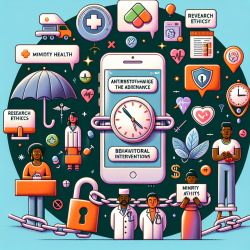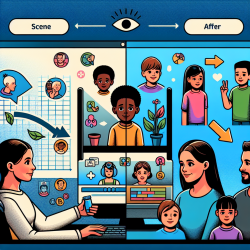Introduction
In the realm of public health, ensuring adherence to antiretroviral therapy (ART) among people living with HIV (PLWH) is crucial for both individual health and broader public health goals. However, methamphetamine use poses a significant barrier to ART adherence, particularly among minority groups such as Black and Hispanic men who have sex with men. A recent focus group study has explored the potential of using mobile technology to support ART adherence in this context, providing valuable insights for practitioners and researchers alike.
Research Overview
The study titled "Perceived risks and amelioration of harm in research using mobile technology to support antiretroviral therapy adherence in the context of methamphetamine use" investigated the acceptability and perceived risks of using smartphone applications to collect sensitive information and deliver interventions. Conducted among Black and Hispanic PLWH who use methamphetamine, the research highlighted both the potential benefits and concerns associated with mobile health (mHealth) interventions.
Key Findings
- Confidentiality Concerns: Participants expressed apprehension about the potential unintentional disclosure of their HIV status and methamphetamine use, fearing both social stigma and legal repercussions.
- Invasiveness of Assessments: Daily assessments, particularly those related to methamphetamine use, were seen as potentially triggering cravings and discomfort.
- Suggestions for Improvement: Participants recommended indirect questioning, focusing on positive behaviors, and ensuring robust data protection measures to mitigate these concerns.
- Motivators for Participation: Altruism, alongside financial compensation, was a significant motivator, with participants expressing a desire to contribute to research that could benefit others in their community.
Implications for Practitioners
For practitioners looking to implement or improve mHealth interventions, this study offers several actionable insights:
- Ensure confidentiality and privacy by using coded language and secure data management practices.
- Design interventions that are user-centered, allowing for customization and user-initiated interactions.
- Consider the psychological impact of assessments and provide supportive content to mitigate potential negative effects.
- Engage participants as stakeholders in the design process to ensure interventions meet their needs and concerns.
Encouraging Further Research
While the study provides valuable insights, it also highlights the need for further research to refine mHealth interventions. Practitioners and researchers are encouraged to explore innovative methodologies, such as adaptive trial designs, to evaluate and optimize these interventions effectively.
To read the original research paper, please follow this link: Perceived risks and amelioration of harm in research using mobile technology to support antiretroviral therapy adherence in the context of methamphetamine use: a focus group study among minorities living with HIV.










